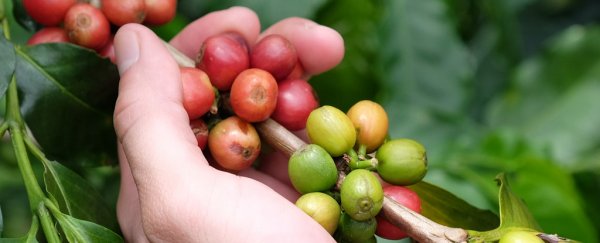As the climate crisis causes havoc in temperature and rainfall patterns around the world, one of the many crops under threat is humanity's precious coffee. Now scientists have identified a coffee-making plant that could be more robust against the rigors of the shifting seasons.
The plant is stenophylla coffee or Coffea stenophylla, a wild and relatively rare species found in Upper West Africa. Compared with the more commonly used coffee plants, it's better equipped to handle climate shifts.
What's more, it has a similar flavor to high-quality Arabica coffee made from the arabica (C. arabica) plant, so it should keep connoisseurs of the hot beverage satisfied as well. Arabica - currently dominating 75 percent of the market - is one of the varieties particularly under threat from climate change, as the plant needs very specific conditions to grow.
"This species substantially broadens the climate envelope for high-quality coffee and could provide an important resource for the development of climate-resilient coffee crop plants," write the researchers in their paper.
The stenophylla plant is actually in the process of making a dramatic comeback: it was previously thought that it had died out everywhere except in the Ivory Coast, with very little information published on it for several decades. However, the variety was recently rediscovered in Sierra Leone.
Scientists tested samples of C. stenophylla to figure out its taste, and ran models to assess the sort of conditions it could grow under. It can manage temperatures of up to 24.9 °C or 76.8 °F - warmer conditions than either C. arabica or C. canephora (what we know as robusta) variety.
Earlier research suggests the stenophylla plant can survive periods of drought and is also partially resistant to coffee leaf rust, so it has many credentials that make it a possible option for coffee production in more challenging conditions – if we can grow enough of it.
"Poor yield has been given as the main reason stenophylla failed to become established as a major global coffee crop species, although competition from robusta coffee, whose early progress towards becoming a global commodity coincides with the decline of stenophylla farming, is likely to be a major contributing factor," write the researchers.
Stenophylla coffee has also proved popular with coffee tasting experts in blind taste tests carried out over the past year, the researchers report. Further down the line, the plant could be cross-bred to add extra climate resilience to other species.
Switching to more hardy coffee species is only one option that the industry is looking at: relocating coffee bean farming and adapting different aspects of coffee bean production are ideas that are also being considered, though the best route of all would be to tackle the root cause of it all - the devastating effects of climate change.
Seedlings are now being planted to assess the viability of stenophylla as a high-quality source of coffee in the future – though it might be a while before anyone except researchers and experts get to have a taste.
"It's not going to be in coffee shops in the next couple of years, but I think within five to seven years we'll see it entering the market as a niche coffee, as a high value coffee, and then after that I think it will be more common," Aaron Davis, the head of coffee research at the Royal Botanic Gardens in the UK, told BBC News.
The research has been published in Nature Plants.
